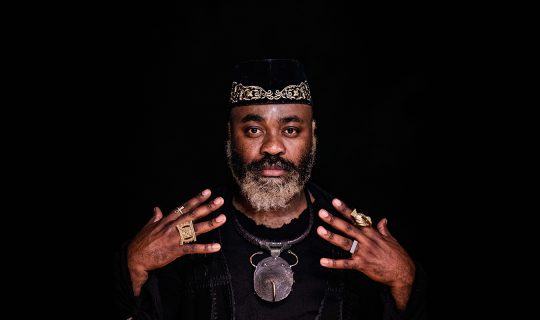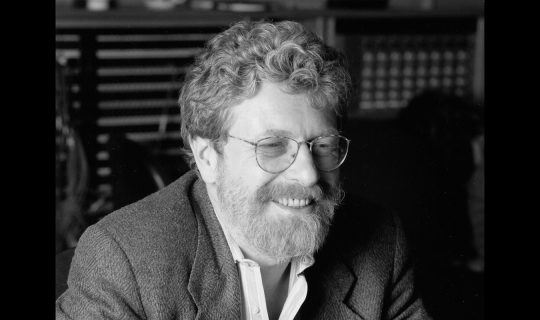October 10, 2012
At the Blue Note on September 6 as part of guitarist-vocalist Lionel Loueke’s new group, pianistRobert Glasper was in the mood for mischief. He played percussion on a Corona bottle; quoted the “slappa de bass” line from the movie I Love You, Man; and worked in some prepared piano. But goofiness was just one side of Glasper’s performance that night; elsewhere, the keyboardist’s dazzling runs elicited impressed whoops from the leader, and steered the ensemble into a thrillingly woozy, broken groove. Unquestionably serious but always bringing a sense of play to his projects, Glasper has released Black Radio Recovered: The Remix EP, which features retoolings of tracks from his latest album by artists like Pete Rock, Georgia Anne Muldrow, and Ahmir “Questlove” Thompson, today. Loueke’s Heritage, co-produced by Loueke and Glasper, was released on August 28. It features Glasper’s keyboards, his compositions “Tribal Dance” and “Bayyinah,” and “Hope,” a track co-written by Glasper and Loueke.
Let’s talk about Heritage. Can you tell me about co-producing with Loueke?
It was…super-simple. Some production jobs can be hard. But when you have a great band, and a great artist, and good songs…good studio, good engineer…it just makes everything easier. Lionel already had a certain sound that he was bringing to the table that no one else has. The only thing was just bringing his sound to the people. The fact that he asked me to do it was amazing, because he sits across from Herbie Hancock every day. So to ask me to do something is, like, “Wow.” That’s an honor.
What was it like writing together?
The song was already done. “Hope” was already a song. It’s an emotional piece, so I just added some keyboard stuff, and piano. ’Cause originally, that was not supposed to have keys on it. But I told them, “Hell no. I gotta play on this one.” [laughs] So I added some keyboards and piano, and then I just had the idea of adding a little vamp at the very end of the song, after the bass solo. The song kind of dies down, then it comes back with a little tail-end vamp. So I kinda brought that to the table. And I had the idea of putting Gretchen [Parlato] on vocals on it. To give it a little different twist. She actually came to the studio just to hang out, I think. And while she was there, I was like, “Ummm, why don’t you get on it and hum?” That’s what that was like. It was really just adding something on the tail end of the song. But it fit perfectly, like a glove.
I also wanted to mention “Tribal Dance” and “Bayyinah.” They don’t really sound like your trio music or the Experiment.
You know, it’s funny: “Tribal Dance” I wrote in high school. I wrote that song in 11th grade. And I never recorded it. But I would play it every now and then. I used to play it when I first got to New York. I played it on my senior recital in high school, and then when I got to college. So it’s become a little bit of a standard. Like, if you go to Berklee College of Music right now, and go to their ensembles, cats are playing the song. They were playing it years ago. But I never made an actual recording of it. So, when it came time for Lionel’s album, I submitted it to him. I was like, “What do you think about this song?” And it sounds like I wrote it for him.
Right, it has an African feel to it.
Totally. When I wrote it, that’s what I had in mind. An African vibe. After I wrote it, I was like, “I’m gonna call it ‘Tribal Dance.’ ’Cause it feels like that.” I wrote “Bayyinah” maybe two years ago. My fiancee’s aunt was in a hospice. And she was dying. And she just had such a thing about her. She’s one of them people that when you meet her one time, you never forget her. She had one of them auras about her. And I literally met her, sat in the room with her for a little while, and then I went out into the hallway and I sang that song into my phone. It came to me right there. And when I got home I transcribed it. And her name was Bayyinah.
We gotta talk about the new track “Dillalude.” Can you put the magic of [the late hip-hop producer J] Dilla into words?
Nope! [laughs] I have a different perspective, because it’s not just listening to Dilla and loving it; I got a chance to be at his crib and watch him make beats.
Can you tell us about that?
When Bilal first got signed to Interscope Records, one of the producers they had him work with was Dilla. So he brought me to Detroit with him, to work with Dilla. We hung out with Dilla for a week-and-a-half, two weeks. Every day. In the studio, kickin’ it, eating. All of that. Getting the real experience of it all. We would walk to the club, and chill in there, and that gives him momentum, and then he would go to the studio. We got to the studio at like four in the morning [one time], and we watched him make “Reminisce.” And that song consisted of three or four different bass lines from three or four different records. It was amazing. I mean, we got to watch him make all kinds of shit there. Like, “How’d you get that from this? And this from that? What are you thinking about?”
Tell me about working with Questlove and Solange Knowles. What is that song a remix of? That song’s not on Black Radio.
That’s a song called “Twice,” by Little Dragon. We did a version of “Twice” but it’s only on the Japanese release. It was Ahmir’s choice. I asked him what song from Black Radio did he wanna remix, and he chose “Twice.” So we did that. I’ve been working with Ahmir for years now. I think I met him through Bilal, when I was the music director for Bilal. Ahmir’s been calling me to do stuff with the Roots probably since 2005. I would always do a show here and there, whenever they needed an extra keyboard player or something. I’ve done quite a few shows with them. So I knew when I did this remix [EP], I wanted to have Ahmir do it with me. I’ve known Solange since she was nine years old.
You’re both from Houston.
I went to high school with Beyoncé. And me and Beyoncé were really cool, so I knew Solange since she was really, really small. My little cousin LeToya Luckett was in Destiny’s Child as well. So I’ve known that whole clique for a while now. So when it was time to do the remix “Twice,” Solange was actually Ahmir’s request. He’s like, “Yo, I’m gonna holler at Solange to do this.” And I was like, “Oh, good idea.”




